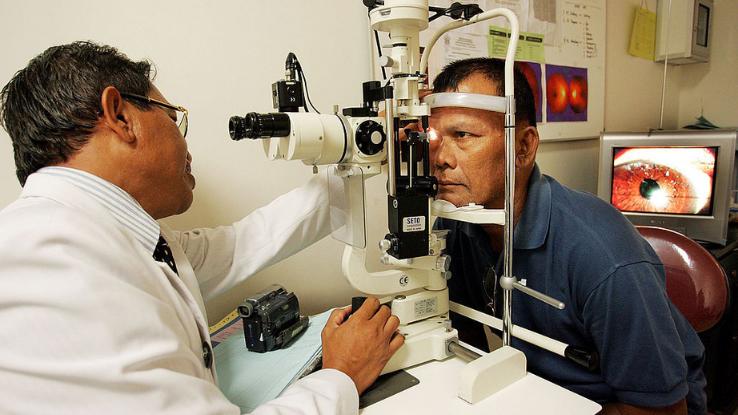
The urge to wipe your eyes may never have been stronger, but hold off for as long as you can. Since the onset of COVID-19, not touching your eyes in public or after touching anything has been a focal point in our efforts to slow the spread of the coronavirus. To add to this, the “new normal” we’re living in also includes rougher allergy seasons because of warmer temperatures and poorer air quality due to increases in seasonal wildfires. This can mean even more eye irritation and a greater temptation to rub or scratch your lids.
More than one year into the pandemic, flowers have once again bloomed, and in places all over the world it can look like it’s raining pollen. Relief for itchy eyes can be hard to find after such a tough year in part because of the precautionary measures that many people followed to slow the spread of COVID-19. Staying indoors will alleviate allergy symptoms, as will wearing a mask. But after a year of doing both, going maskless can leave your face and your eyes susceptible to irritation from allergies. If you’re finding your allergy symptoms — particularly an itchy or burning sensation in your eyes — are picking up, try these solutions to find some relief.
6 Common Causes for Burning Itchy Eyes

1, Pollen and Seasonal Allergies
Both are on the rise due to COVID-19 and global warming. Researchers believe that the amount of pollen plants release into the air will continue to rise in coming years. If you have seasonal allergies, these increasing levels of pollen may make your symptoms stronger. Checking your local pollen count can help you determine the best days and times to be outdoors without increasing your symptoms.
2. Smoke and Wildfires
The number and severity of record-breaking droughts are affecting significant parts of the United States. And these droughts can lead to more wildfires that are also starting to overlap more and more with allergy season. Smoke from those fires is reaching much wider areas. If that sky starts looking smokey, an N95 mask can help alleviate the smoke you inhale into your lungs. But smoke is also one of the causes of red, itchy eyes, so it’s important to protect your whole face when the air quality drops.
3. Infection
Bacterial and fungal infections of the eye are not uncommon. Conjunctivitis, which you might know as as “pinkeye,” and uveitis, a less common eye ailment, both cause inflammation and irritation that result in itchy, burning sensations. These typically require treatment by your doctor.
4. Dry Eye
Dry eye can be a side effect of a range of medications, from birth control to decongestants. We’ve compiled a list of drops that can help combat dry eyes, but other remedies can help too.
5. Contact Lens Issues
Maybe you need some saline solution or a few days going contact-free. Contact lenses can cause itchy discomfort for a number of reasons, including dryness, an improper fit or even something on the lens like dirt or debris.
6. Year-round Allergies
Some allergies aren’t seasonal. Allergens like dust or animal dander can be (an uncomfortable) part of everyday life.
How to Fix Itchy Eyes at Home

Relief for itchy doesn’t always require a trip to the doctor. There are plenty of household items that can help prevent eye issues.
Try Over-the-Counter Meds
These are great because so many that were only available as prescriptions have become available over-the-counter at your local pharmacy. These are some common over-the-counter meds you can pick up today. Check with your doctor before taking these to ensure they won’t cause unwanted side effects due to other medications you’re taking.
- Cetirizine (Zyrtec, Zyrtec Allergy)
- Chlorpheniramine
- Desloratadine (Clarinex)
- Diphenhydramine
- Fexofenadine (Allegra, Allegra Allergy)
- Levocetirizine (Xyzal, Xyzal Allergy)
- Loratadine (Alavert, Claritin)
Dampen a Face Cloth With Water
This is an old trick that actually works. Water can help reduce swelling and relieve an itch much better than your fingers will. If you have time, sitting back and relaxing with a damp cloth on your face can help freshen things up around your eyes.
Protect Your Indoor Surroundings
In addition to looking nice, keeping your home well-maintained can actually have some health benefits. While it’s more sanitary in general, cleaning surfaces and your indoor air can also keep your eyes feeling better. Wiping surfaces down after you’ve had the windows open, for example, keeps pollen from lingering and irritating your eyes.
Using an air purifier in your bedroom or any room you spend more than a few hours in can significantly reduce facial irritation symptoms like burning eyes. If you have to keep the windows closed to save heat or prevent smoke or pollen from entering your space, an air purifier is worth the investment. Look for a “high efficiency particulate air filter,” or “HEPA filter,” which can capture tiny smoke and pollen particles.
Accessorize With Sunglasses and Hats
Wearing a mask that covers your nose and mouth can help keep the itchy eyes at bay. Your breathing could be spreading potential irritants. A face shield can give you even more relief. If “masking up” isn’t quite for you right now, remember that a hat and sunglasses can help protect your eyes from allergens in the air.
Use Eye Drops
Eye drops can help relieve dry eye and the itchiness and redness that come with it. There are a lot of options available over the counter that you can find anywhere from pharmacies to gas stations.
Take a Shower or Wash Your Face
Until the day we all have eye wash stations like our high school science class, we suggest taking a shower or giving your face a thorough wash above a sink. A full on bath or shower can help reduce whatever irritants might be on your body, in the event they’re not just on your face.
Hold Off on Makeup or a Particular Cream
Eye creams can be great for keeping skin around your eyes moisturized. But your body can have uncomfortable reactions to them if you’re sensitive to a particular ingredient. The same can go for makeup and other products that you apply on your eyelids or near your eyes. Holding off on using them a bit can give some relief to your itchy eyes.
Avoid Touching Your Face
We want to echo this again: Not touching your face can be a hard habit to break, but it prevents the spread of disease and whatever’s irritating your eyes. If you can’t resist the urge, try to wait until you’re able to wash your hands first — you can sprinkle a little water on your face while you’re there.
Help for Itchy Eyes From Your Doctor

Sometimes, home remedies don’t do the trick. Usually, help for itchy eyes is cheap and affordable with insurance.
If you’re not finding relief using the tips above, don’t worry. You may need to contact a doctor to get to the root of your eye irritation. Persistent red or itchy eyes can be the symptoms of a larger issue, and your doctor may suggest some of the following to help:
Immunotherapy, or Allergy Shots
If allergies are at the root of your discomfort, allergy shots may help. These medicines work by gradually exposing your immune system to the substances you’re allergic to. This helps your body develop immunity to their irritation over time.
Doctors typically give allergy shots to people who have severe allergy symptoms that over-the-counter meds don’t relieve. These shots are given as doses every few months over the course of a few years. These can be helpful if you have allergies to mold, dust, grass, pet dander or insect bites. Allergy shots typically provide relief for most allergy symptoms, including red, itchy eyes and a stuffy nose.
Other Prescription Drugs for Allergies
Prescriptions for allergy relief that a doctor can write include nasal steroids like beclomethasone (Beconase, Qnasl, Qvar), ciclesonide (Alvesco, Omnaris, Zetonna), fluticasone furoate (Veramyst) and mometasone (Nasonex). Acrivastine and pseudoephedrine (Semprex-D) are other medications for nasal allergies and come in pill form.
Slit Lamps and Other Strategies
Not all solutions for red, itchy eyes might come in the form of medicine. A doctor may use a tool called a slit lamp (pictured above) to see what’s going on in your eye area. Ultimately, relief for itchy eyes may only come with time. It’s best to monitor when your irritation occurs and for how long. Your doctor can use these details to help diagnose your eye issues.
Resource Links:
“Extreme Allergies and Climate Change,” Asthma and Allergy Foundation of America
“How To Cope When Smoke Gets in Your Eyes,” American Academy of Ophthalmology
“Allergy Tablets (Sublingual Immunotherapy),” American College of Allergy, Asthma & Immunology
“Allergy Shots (Subcutaneous Immunotherapy),” American College of Allergy, Asthma & Immunology
“Allergens and Pollen,” Centers for Disease Control and Prevention
“Allergy medications: Know your options,” Mayo Clinic
“Allergy shots,” Mayo Clinic
“Seasonal Allergies Are Worse This Year—Why and What You Can Do About It,” Yale Medicine





